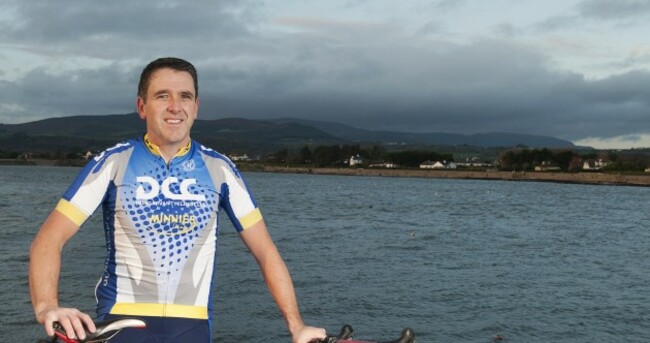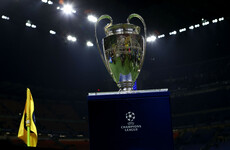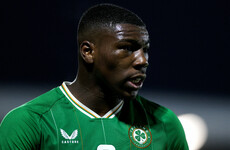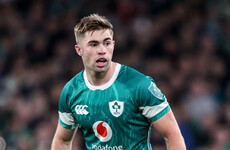GROWING UP IN Dungarvan, cycling was Robert Power’s life. It was all he knew. Everything he did from a young age revolved around the sport. Through his teenage years, he cycled – and won.
His potential was prodigious. It was such that he enjoyed instant success during the 80s on the Irish amateur circuit. He won national titles at both junior and senior level and fell in love with a sport which was enjoying years of unprecedented popularity.
A close family friend first brought him out on the bike and introduced him to the Cidona Carrick Wheelers club. It was there his talent was honed and nurtured. He was the best rider in the country in his pomp.
Hailing from a town steeped in cycling history, Power was destined to follow close friend Sean Kelly to the top. He had all the attributes to cut it at the highest level, the results to back it up and structure to sustain his tilt.
Fast forward four decades and Power’s relationship with cycling has changed. His love remains but he also loathes it. Not resentment or bitterness. Nor is it a vendetta against the sport he once worshiped.
But it’s a feeling driven from first-hand experience of the cheating and double-crossing which has blighted and damaged the sport of cycling beyond repair.
Paul Kimmage described the bizarre relationship as a ‘love affair that will always make me unhappy.’ Power, although he didn’t reach the heights Kimmage achieved in his career, is in the same boat. He remains emotionally invested in the sport even if the overriding emotion is anger.
“I look back now and say thanks be to god I was ten per cent short,” Power tells The42. “Because if you wanted to make it you needed to dope and they got away with it for so long.
“I would say it’s more frustration. If you set out at anything, whatever sport, you want to be the next Henry Shefflin or Lionel Messi. I was the same, I wanted to be the next Sean Kelly and there’s only a tiny fraction who make it and to think guys were cheating to get there is hard to take.”
Power’s career hit a stumbling block before he could realise his full promise. His first win came in Clonmel as a 15-year-old and he then progressed through the ranks, participating in amateur events on the continent.
It was at the World Championships in Moscow in 1989 where he first came across a talented American by the name of Lance Armstrong. The next time the pair would cross paths was three years later at the Olympic Games in Barcelona.
It was from that point their respective careers took contrasting journeys. Armstrong, already an international prodigy, produced a disappointing performance in the road road, finishing 14th. Undeterred, he immediately turned pro. The rest, as they say, is history.
For Power, it was the beginning of the end. He had just ridden the team time trial on the opening Sunday of the Games, finishing 17th. Wearing the green of Ireland, he was in a position to establish himself on the biggest stage. With such a platform, the opportunities were boundless.
But the day before his main event, the road race, he was involved in a crash which would have physical and physiological effects.
“We went to watch a bit of the track cycling,” he recalls. “The lads decided they wanted to go off for a cycle and I didn’t want to. I remember saying ‘no, no’ but eventually they persuaded me.
“We ended up going up a climb in Barcelona and on the descent coming down, I was at the back of the group and one of the lads went around the bend and shouted ‘car’.
“I automatically swung to the left to swing into the ditch after seeing the car and trying to avoid it but I just couldn’t react in time and went head first into it. I don’t remember anything from there. I was unconscious for an hour or so.
“The lads managed to get me in the back of a car and brought me into hospital. For two days I couldn’t feel my legs, I’ll never forget it. It knocked an awful lot out of me and I never really recovered my confidence.”
Power spent seven weeks in hospital before returning home to continue his rehab in Waterford and then Blackrock Clinic. A broken collar bone and internal bleeding on his kidneys were the two major injuries he sustained.
“I remember when I was in hospital, I kept asking would I walk again. I knew the doctors were worried. When I made that recovery, I said ‘f**k it’, I’m lucky. It could have been a lot worse. I had no helmet on, nothing.
“When I got home, I had no interest in the bike. I wasn’t able to cycle for a few months anyway but I just didn’t get back into it at all. Looking back, it had a bigger effect on me than I originally thought.
“There was a nervousness there. Flash backs, coming down that hill at speed. Mark Cain, one of my team-mates, totally panicked as his sister, Debbie, was involved in a similar accident a couple of weeks previous. She is in a wheelchair since.”
Time can act as a good healer and as the weeks progressed, the physical scars alleviated but mentally Power didn’t carry the same determination or undiluted appetite for success.
When cycling wasn’t there to fill the void, he looked for relief and comfort from another source.
“I would go down for a few pints with the lads, a few frames of snooker. That went on for three months,” he admits. “I was in bits, physically and mentally.
“One day I called my cousin and he said ‘no we’re not going down for pints today, we’re going for a cycle’. He didn’t do any cycling but saw what was happening to me. We went out for 20 miles and after that I promised myself I’d get back into it.
“After two weeks training, I won the race in Blarney and I had that buzz back but I wasn’t the same. The crash was always on the back of mind. If I led at the top of a climb, I’d always be last at the bottom.
“There was nothing there. My back was giving me trouble. It just felt like my left leg was completely numb, like it wasn’t pedaling. I went everywhere, doctors in the UK, but nobody could figure it out.”
Power was scheduled to ride in the 1995 An Post Rás, but it reached a point where he simply couldn’t continue. He was practically lifted off the bike in Kerry the week before and he knew, in his heart of hearts, it was the final straw. It all became too much. At the age of 24, his career, both professional and amateur, had been cut short.
“There was disappointment, of course. I was still young,” Power continues. “I thought I would recover and had the next Olympics to look forward to.”
From there, he didn’t go near cycling for another decade. He separated himself from the sport, went travelling, worked part-time in a clothes shop, represented Ireland at fishing and took up photography.
But cycling was always there, at the back of his mind. He would watch the guys he had competed against forge successful careers for themselves, achieve sweeping success. It was difficult to completely switch off.
“I shouted and watched the guys I raced against and even though I wasn’t racing, I was still absolutely mad about it. But there came I point when I knew something wasn’t right, I knew.
“Lance Armstrong’s first Tour win and I switched off. I didn’t watch it anymore, flicked in and out of different events, but didn’t watch another Tour until a few years ago.”
Before he retired, Power had spent a short time in France, riding as an amateur in the pro-am events. He experienced the cut-throat nature of the existence for himself.
“When you look at the guys I raced against at junior level and then around 1992, after the Olympics, it all went bananas. All the books and recent developments show that. It was blatantly obvious – but it was still a bit of shock when it came out.
“Stephen Spratt, one of my team-mates, was completely disillusioned by it all. He couldn’t handle it but the only thing he ever said to me was: ‘I’m here to race and make some money, you’re young and have the talent, you will be offered drugs, turn pro on your own steam then make your decision’.
“It’s an extremely difficult life. Very few make it and I did make some money from it so I don’t regret anything, apart from hitting that car. There are great memories but I’m just glad I didn’t get to that level.
“I’m not bitter or don’t hold a grudge. Some people say Paul Kimmage does. I understand where he’s coming from. He could have made it, he was a serious cyclist. He’s fighting for the good of the sport and I thank him and admire the work he’s done.”
Now with three young kids, Power, who works in GSK’s consumer healthcare manufacturing site in Dungarvan, was keen to give something back to the community.
GSK annually organise a Wheelie Good Cause cycling event which Robert is also involved in, to help raise funds for GSK’s chosen charity partners each year.
He established an underage league in Dungarvan to encourage teenagers to get active and ride their bikes – but it was designed for nothing more.
Naturally, however, there have been those who’ve showed promise.
“I started the club for fun,” he explains. “To get young boys and girls out in the fresh air, learning how to ride their bike safely. There are a few guys who are beginning to race now. That’s fine but I can’t push them, it’s not right.
“There’s one young lad who is U12 time trial champion. I know his father well, we went to school together. I was over at his house recently and I just told his parents to make sure Mark keeps playing all his other sports. I didn’t say much more.
“When he’s old enough he’ll make his own decision but I couldn’t encourage anybody to pursue a career in professional cycling. It’s a horrible life, there’s nothing fancy about it.
“I started doing the league to get guys out in the bike. Ten lads go for a cycle that’s what I want.
“If Mark wants to race I’ll give him whatever help or advice I can but I could not encourage anyone to go into the sport of cycling.”















A very honest article
Super article
More cyclists could help win more support for their sport by not chatting 3 abreast in the middle of the busiest back roads whilst ignoring the long line of traffic behind them. Gets on my tits every time. And when you beep them they go all nuclear with up yours hand gestures.
Why don’t you cycle and see what’s it’s like scary ,I’ve cycled 10 years and never seen 3 a beast ,Wat I’ve seen is idiot drivers taking chances around blind corners due to being in a hurry to go no where ps I drive a car
Tweedledumb,I guess your the very reason why they cycle 3 a breast as they can recognise a selfous Git approaching who will give less than a meter space to them. How you managed to link that to article is beyound me. New year soon, get rid of the negative vibes.
@”Tweedcap”: That has to be the most ridiculous moronic comments of the month!
How you managed to link an article on Robert Powers career as an athlete to people cycling a bicycle on the road is beyond me!
Seriously, lay off the Christmas Sherry and stop making a show of yourself!
“Busiest back roads”.. bad enough that cars Lord it on main roads, but you want to run cyclists off back roads as well! And I don’t even cycle. Read the rules of the road, they have as much a right to be there as you have in your car
@ Barney. This guy was out cycling with mates when HE hits a car. Doesn’t surprise me one bit. They act like a bunch of selfish pr1cks most of the time hogging the whole road. Single file is basic manners to let cars pass safely. Blatant disregard for their own and others safety. You’re obviously one of them if your taken offence.
@TweedleDope: Take your moronic rants somewhere else you TW@T!
And also learn how to drive a car properly, Idiot!
Ah don’t be like that Al.
No need for playground behaviour and name calling. There’s a good lad.
Smarten up then and go read the rules of the road and stop trolling the comments section here, D1ckhead!
Lol. Seems to be a never ending supply of toys in that little pram of yours. Anyway have a great day.
Get a life you sad Troll!
Tweed cap – firstly I have never seen cyclists cycling three abreast except on the annual Ring of Kerry cycle when you get a lot of once a year cyclists out. Secondly, it is not against the rules of the road to cycle two abreast. Because of the number of near misses I have had with cars passing me on blind bends and on straight roads with oncoming traffic I now cycle in the middle of the lane. It’s not a lack of courtesy thing – it’s a self preservation thing.
Don’t feed the Troll @Joeconway
Well done, great article, the more of these stories come out the harder it is to believe ANYONE was clean back then…..unfortunately. Sorry for shouting. More of this please.
All the more amazing how Roche and Kelly, made it to the top and they where as clean as whistles.
Lolz etc
If that’s what you believe Stephen but as a cyclest I’m aware that many questions have been asked of both its a dirty sport which spoils the names of all involved be they clean or otherwise. Pity because I want my son to compete but I could never encourage him to do it for anything more than fun or fitness
I could be wrong here – but I detect just a hint of sarcasm in Stephen’s comment?
Joe there are so many straight faced liars in cycling, those who choose to blindly supports said cyclists it’s a but hard to tell if he’s serious or not. Either way, still a great article
Your not wrong Joe.
Raced against him in my young days. He was special an amazing talent. Fair to say he could win at will. Great story
Back to the article folks . He is man i idolised as a youngster when I was growing up. Unbelievable talent and had to be to shine in the carrick cidona club at that time.down to earth cyclist who is as honest and genuine as you can get. Really should of made it on the pro circuit refreshing to read such honesty in as many article.